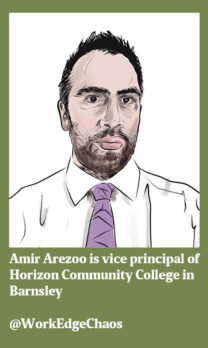This is interleaving: a concrete example
@MrTSci409
I am an advocate of evidence-based practice. The problem is the number of filters (blogs, presentations, conversations, books etc) from the original source (ie, the academic literature). The greater variety of filters and media through which the evidence is presented, the greater likelihood of misconceptions – all of which Ian Taylor addresses in his excellent blog about interleaving.
As he says: “Too many diagrams … create the misconception that you should teach different topics each consecutive lesson”. Instead, by going back to the research (eg, Bjork and Bjork on desirable difficulty), Taylor presents a more nuanced and structured approach so that “you are delivering content which has contrast to enable students to see the underlying principles across these different examples” – ie, look beyond the surface structures that students can often get tied up in.
Curriculum: a team effort
@jon_hutchinson_
Curriculum has been a hot conversational topic from the days of logic, grammar and rhetoric up to the modern herald of the digital native. But as Jon Hutchinson rightly says: “In the meantime, we still have to stand in front of the children on Monday and deliver some lessons. Are we getting it right?”
It’s a fantastic question and Hutchinson is right to be concerned that “there isn’t so much of what these new supercharged curricula will look like in practice.”
He sets out how a subject curriculum can be “intended, implemented and enacted” – and that it must go in this order. It strikes me that whatever the agenda for curriculum development, the intended curriculum must be heavily tied into the vision and ethos of the school that enacts it. Otherwise, dropping curriculum structure and content into a school will have the same outcomes as the many acronym-heavy strategies listed.
Managing management: a couple of tips and tricks for managing behaviour
@adamboxer1
It’s easy to forget that as much as we are teachers of ideas, concepts and skills, we are also teachers of behaviour, social norms and relations. I’ll admit that there are still times where I tell myself “I should have handled that better”, but as Adam Boxer points out, planning for student behaviour is more effective than managing it in the moment. “I realised that there were certain things they would do at certain times, and I learnt to anticipate these things…”
Boxer rightly indicates that behaviour management is as much about the cues and signals we (consciously or otherwise) employ as much as it is about routines and structures of a lesson. Whatever one’s views on behaviour management methods, it’s always easy to forget that “… you aren’t alone. We’ve all been there, we’ve all struggled.” I’d go as far as to say that no teacher has behaviour management truly licked, no matter how long they’ve been in the classroom or what position they have. We are always learning.
Self-efficacy
James Crane @mrcranepe
Grit, resilience, growth mindset – however we frame the necessity for students to self-regulate as learners, it’s also important to understand the barriers to achieving this ideal state. James Crane frames, then breaks down, self-efficacy as a means of enabling metacognitive strategies to take effect. In order that students can “typically exhibit an awareness of the degree of challenge in the task they are attempting and are able to draw on their metacognitive resources to overcome any obstacles with the task”, Crane suggests ways that teachers can work to make this happen. Most pertinent was the reference to scaffolding: rather than make scaffolding explicit in task completion, “these should cause thinking and be faded away over time to support students with completing tasks independently…”
Students meet our expectations – and if we continue to give the scaffolds before they’re necessary, are we continuing to lower our expectations of those who need the highest of high?













Your thoughts